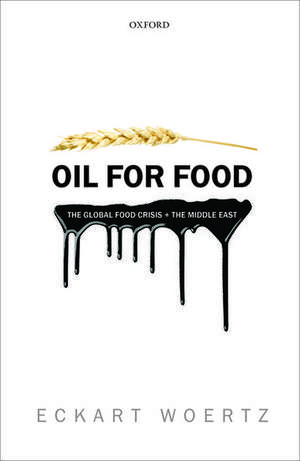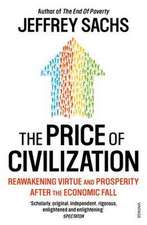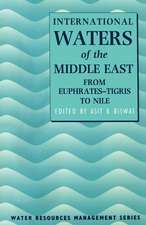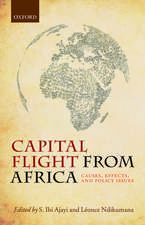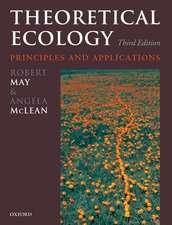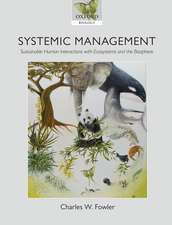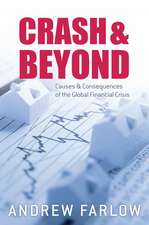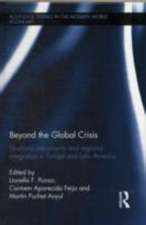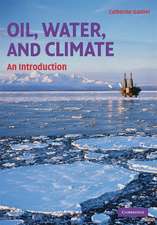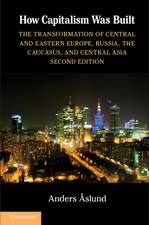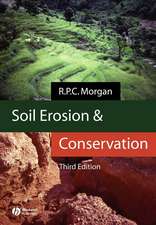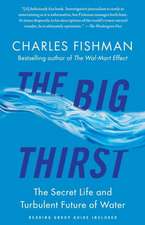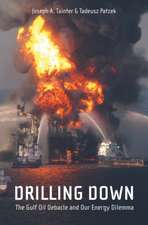Oil for Food: The Global Food Crisis and the Middle East
Autor Eckart Woertzen Limba Engleză Hardback – 24 apr 2013
| Toate formatele și edițiile | Preț | Express |
|---|---|---|
| Paperback (1) | 353.47 lei 31-37 zile | |
| OUP OXFORD – 18 feb 2015 | 353.47 lei 31-37 zile | |
| Hardback (1) | 732.67 lei 31-37 zile | |
| Oxford University Press – 24 apr 2013 | 732.67 lei 31-37 zile |
Preț: 732.67 lei
Preț vechi: 1008.57 lei
-27% Nou
Puncte Express: 1099
Preț estimativ în valută:
140.24€ • 152.38$ • 117.88£
140.24€ • 152.38$ • 117.88£
Carte tipărită la comandă
Livrare economică 09-15 aprilie
Preluare comenzi: 021 569.72.76
Specificații
ISBN-13: 9780199659487
ISBN-10: 0199659486
Pagini: 346
Ilustrații: 4 Figures, 2 Maps, 13 Tables
Dimensiuni: 163 x 241 x 26 mm
Greutate: 0.67 kg
Editura: Oxford University Press
Colecția OUP Oxford
Locul publicării:Oxford, United Kingdom
ISBN-10: 0199659486
Pagini: 346
Ilustrații: 4 Figures, 2 Maps, 13 Tables
Dimensiuni: 163 x 241 x 26 mm
Greutate: 0.67 kg
Editura: Oxford University Press
Colecția OUP Oxford
Locul publicării:Oxford, United Kingdom
Recenzii
... it is to Woertz's credit that he has done such a skilled job of amassing and synthesizing a tremendous pile of historical and contemporary evidence
Eckart Woertz grapples with the delusions of those who depend on the availability and affordability of food and energy in global systems. He highlights the dangerous assumptions of many sovereign and market players as well as the risks implicit in existing asymmetric global arrangements. His insights are deeply researched and compelling.
This book comes at a time when ideas about achieving food security in the Arab world have become popular again. While the author concludes that the ability to pay for food imports rather than the technology for planting food in the desert is what will continue to make Arab countries food secure, an important contribution of the book is to discuss the psychological and geo-strategic issues behind the self-sufficiency concerns. Rich in anecdotes and historical detail the book is not only a superb source of information but also fun to read.
This is a remarkably important book, analyzing one of the most critical issues facing the Persian Gulf Sheikhdoms. Woertz is thorough, detailed, and balanced in his treatment of the problem of food security in the Persian Gulf region and beyond, looking, among other things, at the perils and opportunities of agro-investments abroad, principally in Africa. For anyone interested in better understanding the challenges of food security, both globally and in the Middle East, Oil for Food is a must read.
Woertz's superb political economy analysis of Middle Eastern agriculture could not be more timely, as the global food crisis of the mid 1970sbrought on by high oil pricesseems set for a re-run. The vital relationship between oil and food, and the Middle Easts key role in that relationship, has been all but ignored for a generation. Woertz's study fills a huge gap in our understanding of a topic that is of paramount importance for this region and for the global economy.
Eckart Woertz grapples with the delusions of those who depend on the availability and affordability of food and energy in global systems. He highlights the dangerous assumptions of many sovereign and market players as well as the risks implicit in existing asymmetric global arrangements. His insights are deeply researched and compelling.
This book comes at a time when ideas about achieving food security in the Arab world have become popular again. While the author concludes that the ability to pay for food imports rather than the technology for planting food in the desert is what will continue to make Arab countries food secure, an important contribution of the book is to discuss the psychological and geo-strategic issues behind the self-sufficiency concerns. Rich in anecdotes and historical detail the book is not only a superb source of information but also fun to read.
This is a remarkably important book, analyzing one of the most critical issues facing the Persian Gulf Sheikhdoms. Woertz is thorough, detailed, and balanced in his treatment of the problem of food security in the Persian Gulf region and beyond, looking, among other things, at the perils and opportunities of agro-investments abroad, principally in Africa. For anyone interested in better understanding the challenges of food security, both globally and in the Middle East, Oil for Food is a must read.
Woertz's superb political economy analysis of Middle Eastern agriculture could not be more timely, as the global food crisis of the mid 1970sbrought on by high oil pricesseems set for a re-run. The vital relationship between oil and food, and the Middle Easts key role in that relationship, has been all but ignored for a generation. Woertz's study fills a huge gap in our understanding of a topic that is of paramount importance for this region and for the global economy.
Notă biografică
Eckart Woertz is senior researcher at the Barcelona Centre for International Affairs (CIDOB). Formerly he was a visiting fellow at Princeton University, director of economic studies at the Gulf Research Center in Dubai, and worked for banks in Germany and the United Arab Emirates.
